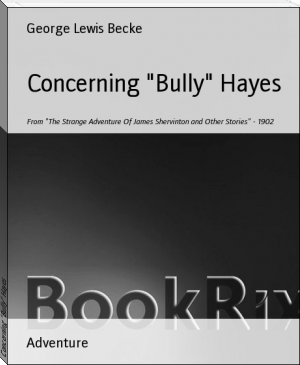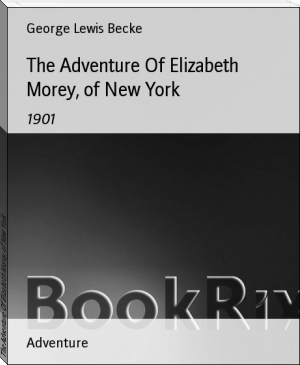Ridan The Devil And Other Stories - George Lewis Becke (free ebooks for android txt) 📗

- Author: George Lewis Becke
Book online «Ridan The Devil And Other Stories - George Lewis Becke (free ebooks for android txt) 📗». Author George Lewis Becke
Together we slowly ascended the bluff, and there a surprise awaited us; for, sitting on their horses, on the brow of the hill, were the dreaded minister and his convict orderly. They had no doubt seen our bags and guns lying on the grass, and had ridden to the crest of the bluff to discover our whereabouts.
Mr Sampson eyed us all very sourly, and scarcely deigned to respond to our salutations, as one by one we walked past him and busied ourselves in silence over our impedimenta. No doubt he saw that both Harry and Walter were very pale, and that Will and I had not yet dried our tears.
'Come here, boys,' he said in his harsh, pompous tones. 'What, may I ask, is the cause of this grief which seems to be shared by all alike?' Then, without waiting for an answer, his glance fell upon Walter Trenfield, who, after saluting him, had turned away, and with averted face was strapping some of our belongings together.
I saw the clergyman's coarse red face, with its fat, terraced chins, grow purple with rage as I had seen it once before, and I instinctively drew back.
'Ha!' he said, and urging his horse forward, he bent down and touched the young convict on the shoulder with his whip. 'Ha! look up, fellow. I want a word with you, sirrah.'
Trenfield, who was stooping at the moment, stood erect, and then, facing the parson, again raised his hand to his cap. His face was deadly pale, and his deep-set bright blue eyes seemed to have suddenly shrunken and drawn back, and his whole body was trembling.
'Look at me, fellow,' said Mr Sampson, for the second time.
_'I am looking at you, sir._'
The words came from between his white lips and set teeth in a low, hoarse whisper, and all the hatred in his heart seemed to go with them. The clergyman eyed him for a few seconds in silence, but the convict met his gaze unfalteringly.
'So 'tis to you, you scoundrel, that your ruffianly fellow-criminals are indebted for so much amusement at my expense! Tell me, you villain, where you got that picture, and who prompted you to display it? Answer me quickly, you unhanged rascal!'
Trenfield's lips moved, but ere he could speak, my eldest brother stepped forward, bravely enough.
'Indeed, sir, Trenfield had nothing to do with the picture. It was given to me, but by some mischance was lost or stolen. I am sure, sir, that Trenfield would not--'
'Trenfield is a villain. How dare you, presumptuous boy, seek to excuse him! A good birching, for which you are not too old, would teach you that reverence and respect for a clergyman which your mother has so forgotten.'
Harry fired up quickly enough at the insulting words.
'How dare you, sir, speak to me in this fashion? My father shall hear of this.'
'Let _me_ deal with him, the bloody-minded dog!' said a voice.
It was that of Walter Trenfield, who, springing forward, presented my brother's loaded fowling-piece at the minister's head. 'Listen to me, you beast in human form, you heartless fiend! I am going to send your poisonous soul to hell.'
He pulled the trigger, but the gun missed fire; then swiftly clubbing the weapon he brought it with terrific force against the clergyman's chest and knocked him off the horse. The orderly at once turned, and fled as his master fell.
The Reverend Mr Sampson lay prone upon the sward, his once red face blanched to a deathly white, and over him, with grounded gun, stood the young convict.
My brother tried to take the weapon from him, but Trenfield tossed him aside with one hand as if he were a straw. Then for a minute he looked at the prostrate man in silence; once he raised the gun by the muzzle, then he threw it aside, and, kneeling beside the clergyman, placed his face close to his.
'You dog, you dog, you damned dog! I could choke you now as you lie, you brute beast. But I will let you live, to go to hell in God's own time, you cruel, flogging wretch! _You_ murdered Thomas May--his rotting body is not a hundred yards away. May the stink of it reach the nostrils of Almighty God--and be in yours for ever!'
He rose quickly, took the saddle and bridle off the clergyman's horse, and, striking the animal a sharp blow on the nose, sent it galloping away into the forest; then he returned and again stood over Mr Sampson, his face working with the violence of his passion.
'Are you going to murder me?' the minister asked gaspingly.
'No,' he replied savagely, kicking him again and again in the face, 'but lie there, you bloody-minded swab, till I tell you you can go.'
And then, his passion spent, he turned to us with outstretched hand,--
'God bless you all, young gentlemen! God bless you, Master Harry! and your good mother and Miss Frances and little Miss Olive. I am done for now. But tell Ruth that if I am taken I'll die a man. And tell her, Master Harry, that--that--'
My brother grasped his trembling hand, as for a moment he stood, gun in hand, and swayed to and fro as if he were like to fall. Then he plunged into the forest.
* * * * *
One night, three weeks after this, and whilst Mr Sampson was recovering from his injuries, and a force of constables, with a black tracker, were scouring the country for Walter, my mother called we children to her bedroom. She had retired, but Ruth Kenna, with tears in her blue Irish eyes, stood beside the bed.
'Quick, children,' said my mother, in a whisper, 'Ruth is going away. Quick, quick; kiss her goodbye.'
And then whilst we, wondering, put our arms around dear Ruth, my mother slipped out of bed, and taking some money out of a cabinet, put it into the girl's hand, and said,--
'Good-bye, Ruth. You've been an honest girl to us. May God bless and keep you always, my dear child, and do not fail to write.'
* * * * *
Next morning there was a great to-do, for Patrick Kenna's house was found to be empty, and he and his daughter and Walter Trenfield were never seen again in our part. But away out on the horizon were the sails of a whale-ship which had been cruising about the coast for some days past; and though my mother kept her own counsel for a long year, we children soon knew that all three had escaped in the whaler, for my brother Harry had received a letter from Trenfield. It was handed to him by the aboriginal 'King Billy,' and contained only these words,--'Good-bye, sir. Ruth and I and her father will be on the blue water before daylight.'
When two years or more had passed, my mother received a letter. It was written from Boston in America, and was signed 'Ruth Trenfield.'
'I am glad she and Walter are happy at last,' said my mother, with the tears shining in her soft eyes.
A NORTH PACIFIC LAGOON ISLAND
Two degrees north of the Equator, and midway between the Hawaiian Islands and fair, green Tahiti, is the largest and most important of the many equatorial isolated lagoon islands which, from 10 deg. N. to 10 deg. S., are dispersed over 40 deg. of longitude. The original native name of this island has long been lost, and by that given to it by Captain Cook one hundred and twenty years ago it is now known to Pacific navigators--Christmas Island. Cook was probably the first European to visit and examine the place, though it had very likely been sighted by the Spaniards long before his time, in the days of the voyages of the yearly galleons between the Philippines and Mexico and Peru.
On the afternoon of December 24, 1777, Cook (in the _Resolution_ and _Discovery_) discovered to leeward of the former ship a long, low, sandy island, which proved to be about ninety miles in circumference. It appeared to be an exceedingly barren-looking land, save on the south-west side, where grew a luxuriant grove of coco-palms. Here he brought his ships to an anchor, and partly to recuperate his crews, who were in ill health, and partly to observe an eclipse of the sun, he remained at the island some weeks. He soon discovered that the lagoon in the centre was of noble proportions, and that its waters teemed with an immense variety of fish and countless 'droves' of sharks. To-day it remains the same.
Fifty years passed ere this lonely atoll was visited by another ship, and then American and English whalers, or, as they were called in those days, 'South Seamen,' began to touch at the island, give their crews a few days' spell amid the grateful shade of the palm grove and load their boats to the gunwales with fat green turtle, turtle eggs, robber crabs, and sea-birds' eggs. From that time the place became well known to the three or four hundred of sperm whalers engaged in the fishery, and, later on, to the shark-catching vessels from the Hawaiian Islands. Then, sixteen years ago, Christmas Island was taken up by a London firm engaged in the South Sea Island trade under a lease from the Colonial Office; this firm at once sent there a number of native labourers from Manhiki, an island in the South Pacific. These, under the charge of a white man, were set to work planting coco-nuts and diving for pearl shell in the lagoon. At the present time, despite one or two severe droughts, the coco-nut plantations are thriving, and the lessees should in another few years reap their reward, and hold one of the richest possessions in the South Seas.
The island is of considerable extent, and though on the windward or eastern side its appearance is uninviting in the extreme, and the fierce oceanic currents that for ever sweep in mighty eddies around its shores render approach to it difficult and sometimes dangerous, it has yet afforded succour to many an exhausted and sea-worn shipwrecked crew who have reached it in boats. And, on the other hand, several fine ships, sailing quietly along at night time, unaware of the great ocean currents that are focussed about the terrible reefs encompassing the island, have crashed upon the jagged coral barrier and been smashed to pieces by the violence of the surf.
Scarcely discernible, from its extreme lowness, at a distance of more than eight miles from the ship's deck, its presence is made known hours before it is sighted by vast clouds of amphibious birds, most of which all day long hover about the sea in its vicinity, and return to their rookeries on the island at sunset. On one occasion, when the vessel in which I was then serving was quite twenty miles from the land, we were unable to hear ourselves speak, when, just before it became dark, the air was filled with the clamour





Comments (0)